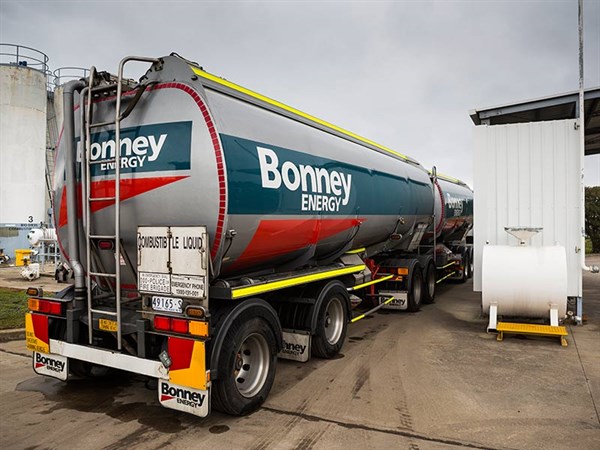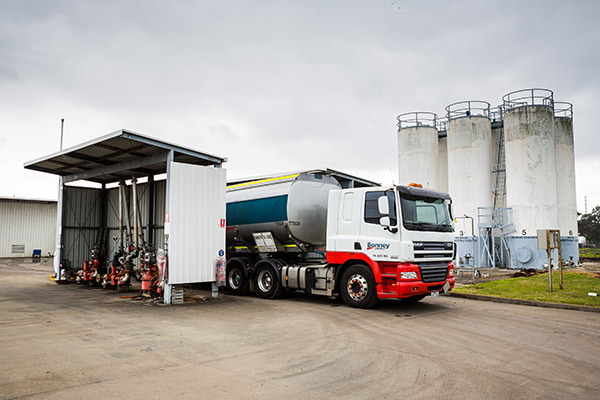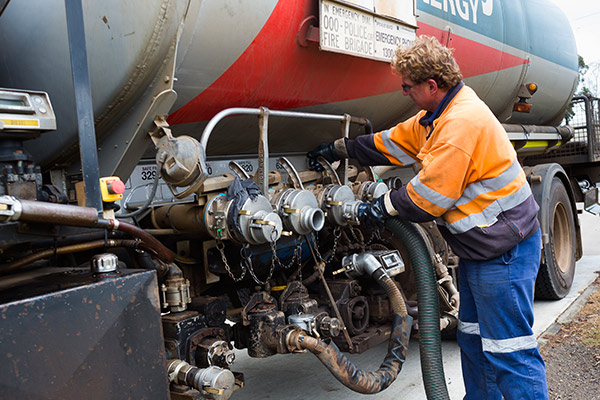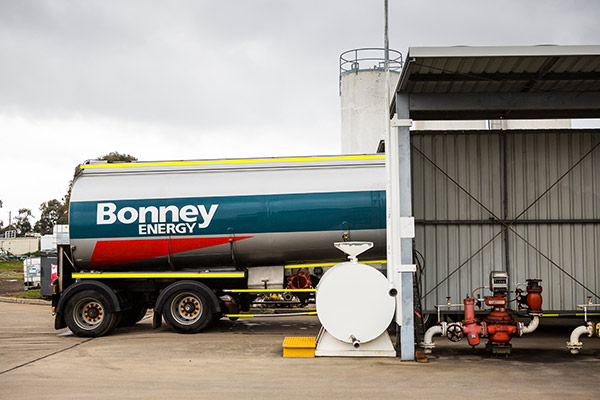Bonney Energy is one small player in the massive logistical network that keeps fuel moving across the country. But the eight-truck company has some big expansion plans in mind
It’s no exaggeration to say that fuel is a vital part of the Australian economy.
Whether it is by plane, car, train, or truck, it’s what keeps every Australian industry — and the transport sector in particular — moving and growing.
Several million litres of petrol, diesel, and aviation fuel are sold across the country every day.
That product mostly comes from refineries operated by the major fuel producers, such as Caltex, Esso, and Shell.
Like the heart and vein network in the human body, the fuel then has to be transported from this shrinking number of centres to retail and wholesale customers throughout the country.
Bonney Energy, based in the Geelong suburb of Corio, handles only a tiny portion of that vast freight task, but general manager Tony Winsall says the eight-truck fleet punches above its weight when it comes to reliability and service.
“We do service stations; commercial deliveries; and on-farm deliveries,” Winsall says. “We have the equipment, the staff, and the product that customers in each sector rely upon.”
New management
Bonney Energy is a small Victorian arm of the much larger Bonney Group, based in north Tasmania.
Launched by the late Byron Lloyd Bonney in 1977, and now controlled by Wayne Bould and Tony Pedder, the Bonney Group comprises of three separate businesses.
As well as Bonney Energy, it is home to the largest private Caltex distributor Caltas, and Tasmanian logistics and transport business Lloyds North.
The Bonney Group had been looking to invest further in mainland Australia, and bought the existing Caltex distributorship of Chisholm Transport in 2012.
It rebranded the business as Bonney Energy but kept the existing staff and fleet.
Winsall came on board as a sales manager, having spent 27 years in the fuel industry, mostly with BP in Geelong and Melbourne. He was promoted to the general manager role earlier this year.
He says he enjoys the greater camaraderie of the smaller business, and the great opportunity to grow exponentially from that small base.
“We’re only a small organisation compared to others because a lot of the head office stuff is based in Devonport,” Winsall says.
“But being a small team means we all know what’s going on, and can react quickly when things change.”
The fuel distribution market is made up of single-brand contracts, equity companies that are at least part-owned by a fuel brand, and independents.
Bonney Energy deals exclusively with the Caltex brand in a single contract.
The company has an exclusive region of around 34,000 square-kilometres that it distributes Caltex products to.
From its home depot in Corio — just a few hundred metres from the Viva Energy refinery there — the region stretches north to Lancefield, then west to Castlemaine and Ararat.
It extends south from there to Peterborough, and then follows the coast back to Corio.
The company is now looking to expand further on the mainland, through buying into either another private operation or a Caltex-owned ‘equity’ distributorship.
Winsall says if a transaction does eventuate, Bonney Energy would be well placed to build on the existing business.
“Since we started in 2012, we have increased volumes delivered by 40 per cent.
“That’s with the same number of trucks and drivers, and the same area.”
One way the company has managed to expand sales is its offer of Caltank storage units for larger customers and groups of customers.
These allow transport companies, for example, to cost-effectively store large amounts of fuel on-site, avoiding the premiums associated with retail fuel purchases.
The company is even providing Caltanks in regional centres such as Maryborough, giving groups of customers there access to wholesale-priced Caltex fuel.
“We want to be a bit different, and this was a reasonably good low cost way of getting into the market,” Winsall says.
Improving fleet
Winsall says the Bonney Energy fleet consists of four prime movers, four rigid trucks, and seven purpose-built tanker trailers.
Most have been bought in the years since the takeover, as Bonney Energy sought to replace older equipment that had moved past its prime.
“The Bonney Group prides itself on its fleet,” Winsall says.
“The Chisholm business had been looking to sell for three or four years [before the acquisition] so wasn’t putting investment into the vehicles.
“They were being maintained, but that was about it.”
Three of the movers take on a single trailer, carrying up to 42,000 litres of fuel at a time.
The fourth is a DAF prime mover that is permanently configured as a B-double, carrying up to 48,000 litres.
This works a double shift daily during the working week, with two drivers alternating for a total of 100 hours.
“Most service stations require around 300,000 litres a month, so we’re probably there two or three times a week.”
The rigid trucks generally carry 20,000 litres, typically for on-farm supplies around Bonney Energy’s rural districts.
Winsall says the company also has a purpose-built dog trailer than add another 12,000 litres to one of the rigid’s loads.
While the fleet has undergone significant upgrades and transformation since Bonney Energy took over, the small workforce remains happily unchanging.
Of the 17 Corio-based staff — there are also some sales staff based in Werribee and Ballarat — only two departed when the business changed hands.
A couple more have since retired, but Winsall says the bulk of the team is as it was, just more experienced now.
This meant the new owners were able to stabilise the business quickly, moving almost immediately into its growth and expansion phase.
The company employs nine drivers: one for each of the rigids and single trailer combinations, and two for the B-double.
“Each of the trucks has its own single driver,” Winsall says.
“They are responsible for keeping it clean and in good working order.”
All eyes on
Asked what specific challenges fuel distributors face in the current operating environment, Winsall offers just one word — “regulation” — and then a whole lot of different incarnations of it.
“The regulations around this business can be really strangling,” he says.
“We’ve just got that many regulatory authorities that we’ve got to comply with.”
He outlines a long list of state and federal authorities interested in Bonney Energy’s operations, as well as the stringent compliance rules and accreditations required of its commercial partners.
“We’re very much a target industry for regulators because we carry dangerous goods,” Winsall says.
The level of interest has significantly increased since last year’s fatal crash involving a Cootes tanker in Sydney.
It was later revealed there were maintenance and fleet management shortfalls at the company.
“The ramifications [of the Cootes incident and investigation] around the fuel industry have been enormous,” Winsall says.
It has mostly been in the form of greater and more regular scrutiny from VicRoads.
“We’ve got to go through inspections every three to six months.”
WorkSafe Victoria also takes a great interest in fuel distribution businesses around the state, ensuring each one has processes far ahead of standard.
Given the product involved, what might seem minor — such as ensuring stable platforms for those working at heights over 1.8m — on other worksites is rigorously checked and enforced across the fuel distribution industry.
Caltex itself has demands of all of the distributor contractors working with it, in order to ensure its own chain of responsibility (COR) liabilities are minimised.
All Bonney Energy tankers are required to have a Safe Load Pass, issued through a third-party accreditation scheme.
Drivers themselves need to be inducted to every refinery and terminal that they require access to.
Winsall doesn’t begrudge the safety protocols behind all of these requirements, but does note that they each add to the on-road costs of business and, inevitably, the retail price of fuel.
Importantly, however, they also mean the industry is now the safest it has ever been over his 30-year career in it.
“The safety growth has been enormous,” he says.
“Practices we did when I first started … you’d cringe nowadays.”
As a fuel retailer [the company has 13 service station outlets across its distribution region] in addition to its transport duties, Bonney Energy is also surveilled in relation to the Trade Practices Act and the threat of collusion and price-fixing in the petrol market.
“We can’t be seen to be talking with others in the industry,” Winsall says, recalling the impacts of an intensive, but ultimately unsuccessful, investigation by the Australian Competition and Consumer Commission.
A place for service
But highly regulated does not necessarily mean highly regimented.
Even with so many practices being so closely watched, Bonney Energy still finds room to differentiate itself positively from its competitors.
Winsall says the company’s level of service has been the key to expanding its volumes to new customers and retaining those buyers over the longer term.
“We have a whole lot of customers in different towns and different businesses,” he says.
“They have a range of different needs in term of their fuel supplies, and it’s our job to deliver on those.”






